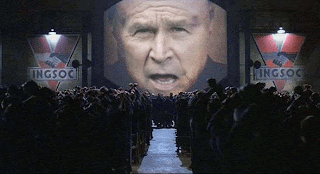Habeas corpus, a Latin term meaning "you have the body," is one of the oldest principles of English and American law. It requires the government to show a legal basis for holding a prisoner. A series of unresolved federal court cases brought against the administration over the last several years by lawyers representing the detainees had left the question in limbo.Bush's move may put the US in unchartered waters. Clearly —the bill demanded by Bush and duly passed by the obeisant Congress is unconstitutional on its face. Even the stodgy Wall Street Journal said that the law was "... a stinging rebuke to the Supreme Court", stripping the courts of all jurisdiction to hear habeas corpus claims filed by so-called "enemy combatants" anywhere in the world.—Court Told It Lacks Power in Detainee Cases, Washington Post
Why is this issue still on the table? Two years ago, Rasul v. Bush decided in favor of the Guantanamo detainees, giving them the right to challenge their detentions. More recently, Hamdan v Rumsfeld ruled decisively in favor of the detainees. The decision was blunt and precise, unequivocal. Clearly —Bush's position is un-American yet the issue persists with congress giving Bush an unconstitutional authority to try detainees before military commission while denying courts all judicial review of habeas corpus claims.
Outrageous!
Tyranny!
The question is raised amid rumors of intervention: will the Supreme Court strike down the law?
The terror legislation set to be signed into law Tuesday by President Bush sits atop an ideological fault line that sharply divides the US Supreme Court and highlights the emerging power of Justice Anthony Kennedy.It would appear that despite Bush's order, the case will go to the Supreme Court where a decision to strike down the bill may be a 5-4 decision with Justice Kennedy the swing vote against Bush's bill.The new law rejects at least five key holdings by the liberal wing of the court and sets the stage for what many analysts believe will be yet another historic showdown between the courts, the president, and Congress.
Mr. Bush's authorization of the Military Commissions Act of 2006 will trigger a barrage of challenges asking judges to strike down the law as illegal, unconstitutional, or both. And it has sparked a heated debate among legal scholars and lawmakers.
According to the Post, Vincent Warren of the Center for Constitutional Rights representing many of the detainees has promised to challenge the bill and filing a motion for dismissal of all of the cases that are at the heart of Bush's order to the court.
"We and other habeas counsel are going to vigorously oppose dismissal of these cases," Warren said. "We are going to challenge that law as violating the Constitution on several grounds." Whichever side loses in the upcoming court battles, he said, will then appeal to the Supreme Court.—Court Told It Lacks Power in Detainee Cases, Washington Post


